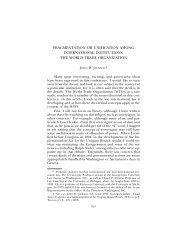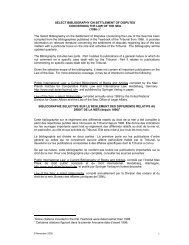Tullio Treves, Conflicts Between the International Tribunal for the ...
Tullio Treves, Conflicts Between the International Tribunal for the ...
Tullio Treves, Conflicts Between the International Tribunal for the ...
You also want an ePaper? Increase the reach of your titles
YUMPU automatically turns print PDFs into web optimized ePapers that Google loves.
1999] INTERNATIONAL TRIBUNAL FOR THE LAW OF THE SEA 813which involve non-state parties, are outside <strong>the</strong> Court’s jurisdictionratione personae.A real conflict, however, might arise. It is <strong>the</strong>oreticallypossible that, in a dispute concerning <strong>the</strong> interpretation ofPart XI of <strong>the</strong> Convention, one state party would seize <strong>the</strong>Court under Article 36, paragraph 2, while <strong>the</strong> o<strong>the</strong>r stateparty would seize <strong>the</strong> Seabed Disputes Chamber under Article187.III.THE IMPACT OF RESERVATIONS TO THE ACCEPTANCE OFCOMPULSORY JURISDICTION OF THE COURTThe priority set out in Article 282 functions only if <strong>the</strong>dispute is encompassed by <strong>the</strong> compulsory jurisdiction agreementin <strong>for</strong>ce between <strong>the</strong> parties. When ei<strong>the</strong>r party has excluded<strong>the</strong> dispute from <strong>the</strong>ir agreement, <strong>the</strong> priority cannotapply. Reservations to declarations accepting <strong>the</strong> compulsoryjurisdiction of <strong>the</strong> Court are a means of obtaining such exclusion.These reservations may have a general purport or may bespecific to law of <strong>the</strong> sea matters. For example, general reservationsmay exclude disputes <strong>for</strong> which <strong>the</strong> compulsory jurisdictionof <strong>the</strong> Court was accepted by <strong>the</strong> o<strong>the</strong>r party less thantwelve months prior to <strong>the</strong> filing of <strong>the</strong> application (such as<strong>the</strong> reservations of New Zealand, 10 <strong>the</strong> Philippines, 11 and <strong>the</strong>United Kingdom 12 ) or disputes with states not recognized by<strong>the</strong> state making <strong>the</strong> reservation (such as <strong>the</strong> declaration ofIndia 13 ). Reservations addressing <strong>the</strong> law of <strong>the</strong> sea may bevery broad (such as those made by India 14 and by Malta, 15which exclude all disputes concerning maritime areas under<strong>the</strong>ir sovereignty and jurisdiction, including <strong>the</strong> delimitationof <strong>the</strong>se areas) or may be focused on specific issues (such asthose made by New Zealand 16 and <strong>the</strong> Philippines, 17 whichconcern only disputes regarding fisheries in <strong>the</strong> exclusive eco-10. See Declarations Recognizing Jurisdiction: New Zealand, para. 2, 1995-1996Y.B. I.C.J. 106, 107.11. See Declarations Recognizing Jurisdiction: <strong>the</strong> Philippines, id. at 110, 111.12. See Declarations Recognizing Jurisdiction: <strong>the</strong> United Kingdom, id. at 120.13. See Declarations Recognizing Jurisdiction: India, para. 8, id. at 95, 96.14. See id. para. 9, at 99.15. See Declarations Recognizing Jurisdiction: Malta, id. at 102.16. See Declarations Recognizing Jurisdiction: New Zealand, id. at 106.17. See Declarations Recognizing Jurisdiction: <strong>the</strong> Philippines, id. at 110.






